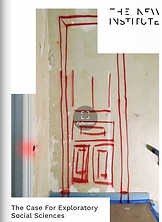Reports etc
Here are links to some recent reports of mine. Lower down are some older blogs (many of my other blogs pre-2020 can be found here on Nesta's website - on dozens of topics ranging from technology to knowledge, politics and social change).
EXPLORATORY SOCIAL SCIENCE
I wrote a report for the New Institute in Hamburg on exploratory social science, making the case for it and suggesting the methods it could use. The report can be downloaded here. This was also the theme of my annual lecture for the Academy of Social Sciences in June 2022 which can be seen here.
ANTICIPATORY PUBLIC BUDGETING
A report (commissioned by the UAE) on how to reform public finance to better cope with the challenges of the 2020s. It argues that finance has fallen behind, with many methods ill-suited to long-term goals and failing to link spending to impact, or to make use of data. It proposes various remedies. To read the report click here.
SYNTHESIS
I wrote this piece about synthesis - in response to conversations with many governments which were struggling to synthesise inputs around infections, hospitals, with economic issues, mental health and much more. Few could articulate how they did this and the science advice literature - and practice - wasn't much help either. So here I offer both diagnosis and prescription. The full piece can be found here. Nature also ran a shorter piece on the topic.



Helvetica Light is an easy-to-read font, with tall and narrow letters, that works well on almost every site.
STEERING GOVERNMENT
A report (prepard for Finland) on how governments can best steer their societies, for example to achieve net zero goals. To read the report click here.
THINKING SYSTEMS
A report for UCL/STEaPP on how systems can think and act more intelligently. To read the report click here.
WISDOM AS A LOOP
A report on wisdom - how to understand it, how to promote and how to build it into institutions and technologies. To read the report click here.



COLLECTIVE INTELLIGENCE AND THE SDGS
A co-authored report for the UNDP on use of collective intelligence methods in development and in particular looking at combinations of artificial and collective intelligence. To read the report click here.


Global digital governance - what needs to be done
February 13, 2020
This report sets out options for global digital governance - from cybersecurity to AI and infrastructures. My report was prepared for Cambridge University China Dialogue Centre, to frame a discussion involving many governments, corporates and civil society. Its proposals look out to what the world will need over the nex 10-20 years. My section is pages 5-18 of the report which is followed by a detailed account of the seminar held late in 2019.

Jobs and collective intelligence in Bangladesh
February 12, 2020
This blog describes work I am involved in - with UNDP and the government's A2i - to help Bangladesh create an adaptive labour market - mobilising collective intelligence to support the country navigating the many threats and opportunities that the next few years could bring. My co-author is Anir Chowdury.

Social innovation and the case for DIY societies
December 23, 2019
Social innovation is the deliberate invention of new solutions to meet social needs. In his new book, Social Innovation: How Societies Find the Power to Change, Geoff Mulgan, a pioneer in the field, argues for matching research and development in technology and science with socially focussed research and development.
This extract from the book shows how we only see a fraction of the potential social imagination around us.
Collective intelligence as humanity's biggest challenge
December 05, 2017
In the last few months the world’s media have noticed artificial intelligence programmes that can surpass humans at the most complex games like Go, joined in the excitement around driverless cars and helped to fuel fears that robots are set to take millions more jobs.
We now live surrounded by new ways of thinking, understanding, and measuring. Some involve data— mapping, matching, and searching for patterns far beyond the capacity of the human eye or ear. Some involve analysis— supercomputers able to model the weather, play chess, or diagnose diseases (for example, using the technologies of firms like Google’s DeepMind or IBM’s Watson). Some pull us ever further into what the novelist William Gibson described as the “consensual hallucination” of cyberspace.
These all show promise. But there is a striking imbalance between the smartness of the tools we have around us and the more limited smartness of the results.
◄
1 / 1
►





